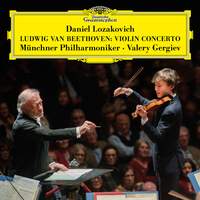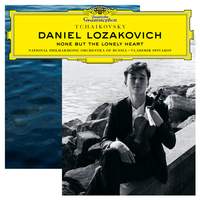Interview,
Daniel Lozakovich on Beethoven
 Praised for his lyricism, tenderness and maturity while still in his mid-teens, violinist Daniel Lozakovich's most recent album sees him tackle one of the Himalayan peaks of the repertoire – Beethoven's daunting and unique Violin Concerto Op. 61. He's also reunited with Valery Gergiev, under whose baton he had his first big break in a television broadcast from Moscow a few years ago playing the very same work.
Praised for his lyricism, tenderness and maturity while still in his mid-teens, violinist Daniel Lozakovich's most recent album sees him tackle one of the Himalayan peaks of the repertoire – Beethoven's daunting and unique Violin Concerto Op. 61. He's also reunited with Valery Gergiev, under whose baton he had his first big break in a television broadcast from Moscow a few years ago playing the very same work.
I spoke to Daniel about his relationship with the concerto and with Beethoven more generally, as well as with Gergiev as a musician and collaborator. He also named some unexpectedly "old-school" influences on his own musicmaking!
The booklet for this album makes the bold claim that Beethoven’s Violin Concerto was the first truly great concerto. It’s certainly innovative in terms of the soloist-orchestra relationship. Do you think there’s a parallel between this concerto’s impact on its genre and the way the Eroica shook up the conventions of the symphony?
This work is essentially a symphonic work: it’s the most symphonic concerto there is. It’s a little later than the Eroica; it was actually the Fourth Symphony that Beethoven wrote around the same time as the Violin Concerto. Every work of Beethoven’s has some similarities, of course, but this is particularly connected with his symphonic works, in terms of the structure.
In the Violin Concerto, both the soloist and the orchestra (and the conductor) are all part of the same unit; it’s a work for both together, not just the soloist plus the orchestra. There are a lot of pages of tutti - and they’re some of the most powerful parts of the piece. So it shows that the soloist and the orchestra are equal in the music.
One thing that distinguishes this concerto is the relative lack of virtuosic “spotlight” moments for the soloist. Might this be partly why it struggled to establish itself in the repertoire until after Beethoven’s death?
I’m not sure whether that’s the case. At around the same time, Fidelio also came in for heavy criticism and wasn’t really respected. If you look at the score of the concerto, it seems to be mostly scales! So if you don’t show what’s inside the music, and what it means, these scales going up and down. When you see it in the context of the harmony it becomes completely different music. I think this is the hardest musical challenge for a violinist – to bring out the deeper aspects, the true music that Beethoven wanted. And if you don’t – even if you come quite close – then the music can end up sounding quite dead.
You mention having immersed yourself not just in Beethoven’s music, but also his letters and writings, and the literature about him. How much do you find this “holistic” approach to understanding Beethoven informs the way you perform the concerto?
When I perform, I have to become the composer in a sense, otherwise I feel it won’t be properly alive. The composer is, after all, the person who wrote the music, so you have to find out who he is, what his interests are, what he is like as a person and so on – as well as knowing all the great works by the composer that are related to the one you’re performing. Then you have to find the best interpreters of those works, and take the best from them, and learn as much as possible.
I don’t actually listen to violinists all that much, actually – I mostly listen to conductors and pianists, especially Beethoven. For me, the biggest inspirations are Furtwängler, Kleiber and Maria Yudina. I’m less concerned with what a given violinist might do with a given phrase than with what a conductor would do with the music as a whole. I feel that you have to have a conviction that you’re playing it the way Beethoven would have wanted. This is what I try to do.
Would you say those conductors from Furtwängler’s era are the main influences on how you approach the music yourself?
Yes; he and Kleiber are among my favourite musicians, together with Rachmaninov. They both do Beethoven like nobody else, and I’m certain that that’s how Beethoven would have wanted it. Maria Yudina is also important to me – her late Beethoven sonatas and in particular No. 32 and the Hammerklavier. I think they show what Beethoven intended – for example Yudina’s simple and direct way of playing trills. For me it can come to represent something otherworldly or even divine.
I wouldn’t say that more modern interpretations are wrong, though – everyone is experimenting. So if someone feels they have found a certain way of playing Beethoven that is right for them, that’s fine; and similarly the attempts to capture earlier styles of playing that would have existed in Beethoven’s own time. But even so, I think the goal is to capture how Beethoven would have heard it in his mind - how he wanted it to sound. I think Furtwängler in particular does this – making the music more powerful than it would have sounded in its first performances. He was convinced that this was the way to achieve what Beethoven really wanted, rather than just reproducing how it would have sounded in his time.
For me, I feel the greatest recordings of all time are the ones that capture how Beethoven intended for the music to sound.
You first learned this piece at a very young age; how did you approach the technical and musical challenges it presents?
This was my dream work ever since I first heard it at the age of eight; I just knew this was a concerto I wanted to record one day. My teacher in Karlsruhe, Josef Rissin, who I’ve been learning with since I was eleven, always used to say that it was too early for me to be tackling the Beethoven Concerto, however much I wanted to play it!
And then one day I took it to him, and we started working on it, and he said “OK, yes – this is your concerto”. And he gave me his approval, in a sense, for me to play it – after we’d been practising it together he knew I would end up playing it. The first time I did so was when I was thirteen, and since then I’ve been exploring it and going deeper into the score. The experience of playing it in different halls is interesting, too; it can give you a different perspective on how the music should sound, and ways to adapt. Some aspects of the piece might emerge better in a certain venue, so I’d then try to reproduce that in future performances.
Learning from great conductors has also been important – not just the ones I’ve mentioned above but also, of course, Maestro Gergiev.
How much has your approach to the piece changed in the five years or so since your breakthrough Moscow broadcast of it with Valery Gergiev?
We’d briefly played together before, but that was the first big one. Over the years I’ve certainly found more in the piece – as part of growing up, I think. There are more colours to be found, and more meanings in the music. There are also more things you can do to become closer to the orchestra, which is very important; it’s not just you, as a soloist. Each concert I learn this a little more. The symphonic nature of the piece has become more important over time, not less; that’s why it’s so important, for this work above all, to have a good relationship with the orchestra and conductor.
This is why it’s so good to play it with Maestro Gergiev – we get to the point of almost having a telepathic bond. Even the first time we played this piece together, it was like we were one single musician. I’ve never experienced such a powerful musical chemistry; both of us adapting to each other’s musicianship. And of course the Münchner Philharmoniker are one of the greatest orchestras in the world as well, so the combination of this and one of the greatest conductors of all time was more than I could ever have dreamed of.
With three concerto albums under your belt – Bach, Tchaikovsky and now Beethoven – what are your plans for future recordings?
I can’t tell you the exact plans, but I know which composer I want to focus on next – whether to record or not I’m not sure, but it's Robert Schumann. His violin concerto is one of the most underrated works ever, and I feel it’s a work of absolute genius – second only to the Beethoven. It’s one of Schumann’s greatest works – the one which he wrote when he was in the asylum, and Clara Schumann and Joachim hid it away from the public for many years because they thought it was a weak work. I don’t know why they thought this but I think they must have just taken a superficial look at the music, rather than looking into it deeply.
If you simply look at the score of it then yes, it does look like he’s just crazy. Some of his later works aren’t his best work, certainly. But if you get into it and get to know it, and why he orchestrated it the way he did, you get the sense that despite all his mental problems there was still a sense of purity within him and that comes out in his music. It’s out of this world.
With live performances currently suspended and lockdowns in place in many areas, artists have been pursuing various “isolation projects” - to keep their musical skills honed and also to continue reaching music-lovers during a challenging time. Have you undertaken anything of this kind?
Not special projects as such. I have projects for myself – I’ve learned a lot of new repertoire which I was always wondering when I’d get round to!
To begin with I was very depressed. I was thinking that there were no concerts any more, and I went through a phase of wondering why we were bothering at all. But somehow I began to think differently, and I’ve learned a lot of new pieces and I think I’m also playing better in general. I read much more, and I have the time to think about things – even questions like who I am and what my goals are. It’s let me straighten out some of my thinking and let me get to know myself.
I was supposed to be playing the Brahms Concerto this summer, but of course that didn’t happen; instead I’ve been learning the Schumann and Shostakovich Concertos, and Prokofiev’s Sonata No. 1 and Concerto No. 1, as well as lots of chamber music and in particular the Tchaikovsky Trio. I also learned the Beethoven Triple Concerto; it’s been very fruitful. These are mostly pieces I would have learned eventually, but not yet.
Normally I’d never have had the time to devote so much of my time to this, and to focusing in on the music – I’d be more concerned with just the works that are coming up, the ones I’m playing in my next few recitals. That can be quite constraining and it makes it difficult to look further ahead; and you also don’t have the time to truly focus on, and get to know, a given work. To get into the music and open up the world of the composer takes a lot of focus and a lot of time; it’s very different from just looking at it a week or so ahead of performing it. You have to dedicate yourself to it, otherwise the composer won’t let you into his world.
Daniel Lozakovich (violin), Münchner Philharmoniker, Valery Gergiev
Available Formats: CD, MP3, FLAC, Hi-Res FLAC
Daniel Lozakovich (violin), National Philharmonic Orchestra of Russia, Vladimir Spivakov
Available Formats: CD, MP3, FLAC, Hi-Res FLAC
Daniel Lozakovich (violin), Kammerorchester des Symphonieorchesters des Bayerischen Rundfunks, Radoslaw Szulc
Available Formats: MP3, FLAC, Hi-Res FLAC





